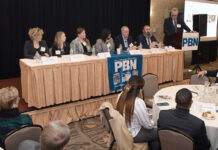
When Joyce Fastino took over as the new owner of The Personnel People a decade ago, she brought with her a penny-wise Yankee attitude that might seem out of style to some of today’s entrepreneurs.
The new president of the Providence office-placement firm quickly set about chopping costs and boosting efficiency. She moved from a spacious office to a less-expansive one down the hall, cutting her rent in half. She said goodbye to the big accounting firm and found a smaller one with smaller fees. When the bookkeeper left to start a family, Fastino skipped hiring a replacement and took on the chore herself.
“If there’s a way to save a dollar, we do it,” she said. “We even recycle paper.”
The old-school strategy paid off, and Fastino saw profit margins climb for several years. And while the growth spurt stalled in 2009, the company has survived the Great Recession and stayed healthy, thanks largely to her single-mindedness and perseverance.
“This year marks our 30th anniversary in business,” she boasted. “I think it says a lot when a small business in Rhode Island is able to last that long.”
The Personnel People, located in Providence’s Financial District, specializes in the recruitment and placement of office staffing, both temporary and permanent. Many Rhode Island businesses call when they are seeking an experienced person to work as an executive assistant, administrative assistant, office manager, receptionist, data entry clerk or in some other support position.
With the Ocean State’s unemployment rate stuck in double digits, you might think a personnel business would be idle much of the time. After all, companies aren’t taking on too many new hires, and when they do, candidates are hardly in short supply.
Nonetheless, Fastino has stayed busy. “Employers have become very particular about whom they hire,” she said. “Often companies will be searching for a candidate, and can’t find the right one. They become frustrated, and that’s when they turn to our agency. We’ve already interviewed candidates who are suited for the position. I personally interview them and assess them. With the click of a button, I can find people who qualify.”
The lingering job crisis also has made her realize the satisfaction she gains when she helps someone land a position. “There are definitely more candidates out there,” she said. “We’re constantly receiving resumes. And with Rhode Island having the third-highest unemployment rate in the country, there are only so many jobs to go around.”
A placement agency can be a lifeline for job candidates struggling to find their way during tough times. And in good times, a service can provide a way out for workers unhappy with their job situation. That’s exactly how Fastino found her way into the business.
She was employed as a store manager, a job that sometimes required her to work nights, weekends and holidays. “I was very dissatisfied,” she recalled. “I gave my two-weeks notice. Then I saw an ad for a staffing coordinator at this agency. I interviewed during my lunch break, and in the afternoon they called me and offered me the job. It was truly serendipity. I didn’t choose this business; it chose me.”
Fastino had graduated from the University of Massachusetts Dartmouth with a degree in psychology and a certificate to teach elementary school, and she found her education gave her an advantage at her new job. The position allowed her to use both teaching and counseling skills. As a staffing coordinator, her responsibilities included interviewing and testing job candidates and placing them with companies. “I found that I genuinely enjoyed helping people gain employment,” she said.
Not long after, the owner told Fastino she was preparing to sell the company. “I made the leap,” the now president said. “I decided to take over the business.”
From the start, she focused on controlling expenses at the three-person office. But those efforts doubled when the recession hit. In 2009 revenue dropped for the first time since she had taken the reins.
She cut overhead by not renewing the company’s Web-hosting contract, and switched to a less costly provider. She began posting her online job ads on a free site, and found she still received plenty of resumes. She also cut back on staff and took over some employee’s duties herself to reduce payroll costs.
“We used to have a person we called the job coordinator,” said the 2006 PBN 40 Under Forty honoree. “She took care of all the job matching. Now I do it. I’m the recruiter.”
Acting as job coordinator allows her to also focus on a second growth strategy: top customer service, a key to generating repeat business. She meets every client and every prospective job candidate.
“When you’re dealing with a company, you want to deal with the owner,” she said of that goal. “I would never send a business a candidate I wouldn’t hire myself.”
The recession also taught Fastino the value of networking. She’s an active member of the Greater Providence Chamber of Commerce, and is constantly forging new contacts.
“Because of our city’s smaller size, you can develop relationships with business leaders and companies more quickly. Everyone knows everyone, and connections lead to repeat and new business.” •











